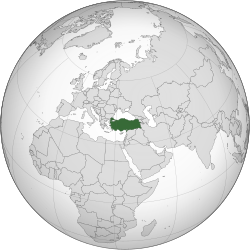
Back Ҭырқәтәыла Abkhazian Turuki ACE Тыркуе ADY Turkye Afrikaans Türkei ALS Википедия:Archives/Türkiye ALT ቱርክ Amharic Turkey AMI Turquía AN Tyrcland ANG
Republic of Türkiye Türkiye Cumhuriyeti | |
|---|---|
| Anthem: İstiklâl Marşı (Turkish) "The Independence March" | |
 | |
| Capital | Ankara |
| Largest city | Istanbul |
| Official languages | Turkish[1] |
| Recognized languages | Greek, Armenian, Ladino[2] |
| Spoken languages[3] | |
| Ethnic groups (2016)[4] | |
| Religion (2019)[5] |
|
| Demonym(s) |
|
| Government | Unitary presidential republic |
| Recep Tayyip Erdoğan | |
| Cevdet Yılmaz | |
| Numan Kurtulmuş | |
| Legislature | Grand National Assembly |
| Establishment | |
| Area | |
• Total | 783,356 km2 (302,455 sq mi) (36th) |
• Water (%) | 2.03 (as of 2015)[6] |
| Population | |
• 31 December 2020 estimate | |
• Density | 109[7]/km2 (282.3/sq mi) (107th) |
| GDP (PPP) | 2022 estimate |
• Total | |
• Per capita | |
| GDP (nominal) | 2022 estimate |
• Total | |
• Per capita | |
| Gini (2019) | medium |
| HDI (2021) | very high · 48th |
| Currency | Turkish lira ₺ (TRY) |
| Time zone | UTC+3 (TRT) |
| Date format | dd.mm.yyyy |
| Mains electricity | 230 V–50 Hz |
| Driving side | right |
| Calling code | +90 |
| ISO 3166 code | TR |
| Internet TLD | .tr |
Website Web Portal of Turkey | |
Turkey,[a] officially the Republic of Türkiye,[b] is a transcontinental country located mainly on the Anatolian Peninsula in Western Asia, with a small portion on the Balkan Peninsula in Southeast Europe. It shares borders with the Black Sea to the north; Georgia to the northeast; Armenia, Azerbaijan, and Iran to the east; Iraq to the southeast; Syria and the Mediterranean Sea to the south; the Aegean Sea to the west; and Greece and Bulgaria to the northwest. It also shares a maritime border with Cyprus to the south.
Turkey is a republic. There are 81 provinces in Turkey. The money of Turkey is called the Turkish Lira. The capital city is Ankara, a city in the central region, called Anatolia. The cultural and economic centre is in the European side of Istanbul. In the past Istanbul was called Constantinople. The republic was founded in 1923, after World War I and a war of independence (Kurtuluş Savaşı). Before that, Turkey was the core of the Ottoman Empire.
Many civilisations were in the area that is now Turkey, like the Hittites, the Roman Empire and the Byzantine Empire. Many important events in the history of Christianity happened in places that are now in Turkey. Because it lies in both Europe and Asia, some people see Turkey as the "door" between them.
Modern Turkey's varied climate lets many kinds of food crops grow, and livestock and forestry are important industries. Turkey makes enough food to feed itself. Turkish manufactures include aeroplanes, electronics, cars, clothing and textiles for home and for other countries.
Turkey is a popular place for tourists to visit. It has hundreds of kilometres of beaches on its Aegean and Mediterranean coasts, and many important historical places.
- ↑ Constitution of Turkey,
Article 3:Türkiye Devleti, ülkesi ve milletiyle bölünmez bir bütündür. Dili Türkçedir. Bayrağı, şekli kanununda belirtilen, beyaz ay yıldızlı al bayraktır. Milli marşı "İstiklal Marşı" dır. Başkenti Ankara'dır.
- ↑ In the Treaty of Lausanne there are several articles on the rights of non-Muslims. In this context, non-Muslim Greeks, Armenian and Jews in Turkey are recognised, and their languages (Greek, Armenian, Ladino) can be taught as mother tongues in minority schools.
- ↑ According to the 1965 Turkey census, they are the eleven most spoken languages respectively.
- ↑ "Turkey" Archived 2021-01-10 at the Wayback Machine. The World Factbook. Central Intelligence Agency (United States).
- ↑ Optimar survey, 2019.
- ↑ "Surface water and surface water change". Organisation for Economic Co-operation and Development (OECD). Retrieved 11 October 2020.
- ↑ 7.0 7.1 "The Results of Address Based Population Registration System, 2020". Turkish Statistical Institute. 31 December 2020. Retrieved 5 February 2021.
- ↑ 8.0 8.1 8.2 8.3 "World Economic Outlook Database, October 2021". Imf. International Monetary Fund. Retrieved 8 April 2021.
- ↑ "Gini index (World Bank estimate) - Turkey". World Bank. 2019. Retrieved 15 November 2021.
- ↑ "Human Development Report 2021/2022" (PDF). United Nations Development Programme. 8 September 2022. Retrieved 16 September 2022.
<ref group=lower-alpha> tags or {{efn}} templates on this page, but the references will not show without a {{reflist|group=lower-alpha}} template or {{notelist}} template (see the help page).

